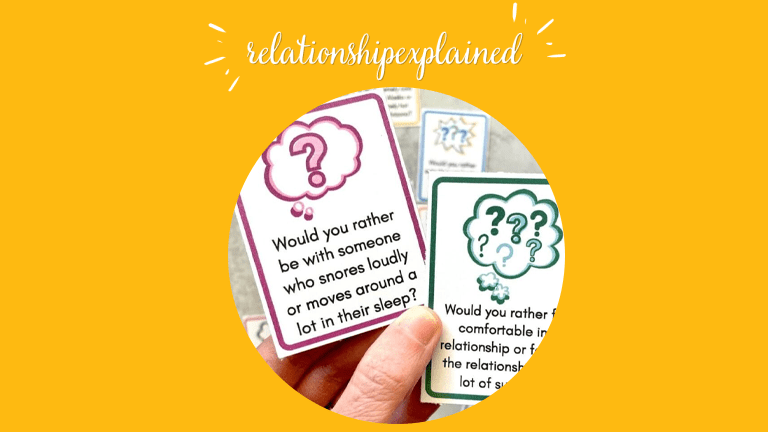Relationship Advice for Couples
Feeling like you and your partner are missing the mark when it comes to communication, or sensing a growing distance between you two? Navigating the ups and downs of a relationship can be challenging, regardless of whether you're in the honeymoon phase or have spent decades together. Turning to relationship advice can be a game-changer […]
Feeling like you and your partner are missing the mark when it comes to communication, or sensing a growing distance between you two?
Navigating the ups and downs of a relationship can be challenging, regardless of whether you're in the honeymoon phase or have spent decades together. Turning to relationship advice can be a game-changer in bridging gaps and rekindling that connection.
- How do you lay the groundwork for a relationship that stands the test of time?
- What steps can you take to face challenges head-on without losing sight of the love that brought you together?
- How can you keep the spark alive, ensuring that both intimacy and individuality thrive side by side?
Let's dive in.
Key Takeaways
- Effective communication, trust, mutual respect, and shared values are key to building a strong foundation for your partnership.
- Navigating challenges with an open mind and a willingness to work together can help you build a stronger relationship.
- Seeking professional help can be a valuable resource if you're struggling to overcome challenges in your relationship.
Understanding the Basics of a Healthy Relationship
A healthy relationship is built on a foundation of trust, communication, love, respect, and interdependence. These elements are essential for a strong and lasting relationship. Here are some key aspects of a healthy relationship:
Role of Communication
Communication is the cornerstone of any healthy relationship. It is essential to express your thoughts, feelings, and needs to your partner. Be open and honest with your partner, and listen to what they have to say. Effective communication strengthens the bond between partners and helps to resolve conflicts.
Importance of Trust
Trust is vital in any relationship. It is the foundation upon which a healthy relationship is built. Trust is earned over time, and it requires honesty, reliability, and consistency. Without trust, a relationship cannot flourish, and it can lead to insecurity, jealousy, and resentment.
Significance of Love
Love is the glue that holds a relationship together. It is an emotional connection that is based on mutual feelings of affection and care. Love requires effort, commitment, and sacrifice. It is essential to express love in words and actions to your partner.
Value of Respect
Respect is a crucial aspect of any healthy relationship. It is the foundation of a strong and lasting relationship. Respect means treating your partner with dignity, kindness, and consideration. It is essential to acknowledge your partner's feelings, opinions, and boundaries.
Interdependence in Relationships
Interdependence is the ability to rely on each other while maintaining a sense of independence. It means respecting each other's individuality while working together as a team. Interdependence requires communication, compromise, and support.
In conclusion, a healthy relationship is built on trust, communication, love, respect, and interdependence. These elements are essential for a strong and lasting relationship. By understanding the basics of a healthy relationship, you can build a happy and fulfilling relationship with your partner.
Navigating Challenges in Relationships
Relationships are not always smooth sailing. They can be challenging, and at times, you and your partner may face difficulties that can put a strain on your relationship. However, with the right mindset and tools, you can navigate these challenges and come out stronger on the other side.
Dealing with Conflict
Conflict is a natural part of any relationship. It's how you deal with it that matters. When conflicts arise, it's important to listen to your partner's point of view and try to understand their perspective. Avoid attacking or blaming your partner, and instead, focus on finding a solution that works for both of you. Remember, you are a team, and you need to work together to resolve conflicts.
Managing Anger
Anger can be a destructive force in any relationship. It's important to learn how to manage your anger and communicate your feelings in a healthy way. Take a step back and try to understand why you are feeling angry. Once you have a better understanding of your emotions, you can communicate them to your partner in a calm and respectful manner.
Resolving Resentment
Resentment can build up over time and lead to the breakdown of a relationship. It's important to address any feelings of resentment before they become too big to handle. Talk to your partner about how you feel and work together to find a solution. Remember, forgiveness is key to moving forward in a relationship.
Overcoming Challenges
Challenges are a natural part of any relationship. They can come in many forms, from financial difficulties to health problems. It's important to work together as a team to overcome these challenges. Be open and honest with each other and support each other through difficult times.
Conflict Resolution Techniques
There are many conflict resolution techniques that you can use to navigate challenges in your relationship. Some of these include active listening, compromise, and problem-solving. It's important to find the techniques that work best for you and your partner and use them consistently.
Remember, relationships take work, and challenges are a natural part of that work. By communicating openly and honestly with your partner and using the right tools and techniques, you can navigate any challenge that comes your way.
Enhancing Connection and Intimacy
A strong connection and deep intimacy are key components of a healthy and happy relationship. Here are some tips to help you and your partner enhance your connection and intimacy.
Building Connection
Building a strong connection with your partner involves spending quality time together, communicating effectively, and being supportive of each other. Make time for each other on a regular basis, whether it's a date night or just some quiet time at home. Listen to your partner and show them that you care about their thoughts and feelings. Be there for them when they need support, and encourage them to pursue their goals and dreams.
Deepening Intimacy
Intimacy can be both physical and emotional. To deepen your emotional intimacy, try sharing your thoughts and feelings with each other on a regular basis. This can help you feel more connected and understood. To deepen your physical intimacy, try exploring new ways to be intimate with each other. This could include trying new positions or activities, or simply taking the time to focus on each other's pleasure.
Spending Quality Time
Spending quality time together is essential for building and maintaining a strong connection. Make sure to prioritize your time together, and try to do activities that you both enjoy. This could include anything from going for a walk to cooking dinner together. The important thing is to be present and engaged with each other.
Improving Sex Life
Sex is an important part of a healthy relationship, but it's not always easy to keep things exciting. To improve your sex life, try communicating openly with your partner about your desires and needs. This could involve trying new things in the bedroom, or simply making an effort to be more attentive to each other's needs and desires.
Discussing Sex Openly
Talking about sex can be uncomfortable, but it's an important part of maintaining a healthy relationship. If you're having trouble discussing sex with your partner, consider seeing a sex therapist. A sex therapist can help you and your partner communicate more effectively about your desires and needs, and can provide you with tools and techniques to improve your sex life.
By following these tips, you and your partner can enhance your connection and intimacy, and build a stronger, healthier relationship.
Maintaining Individuality and Boundaries
Maintaining individuality and boundaries is an essential aspect of a healthy relationship. It is crucial to have a sense of self and space while being in a partnership. Here are some ways to maintain your individuality and boundaries while being in a relationship.
Preserving Individuality
Preserving individuality means maintaining your unique identity while being in a relationship. It is essential to have your hobbies, interests, and friends outside of the relationship. It will help you maintain your sense of self and prevent you from losing your identity. Remember, a healthy relationship should enhance your life, not consume it.
Establishing Boundaries
Establishing boundaries is crucial for any relationship. It is essential to communicate your needs and limits to your partner. Boundaries help maintain respect, trust, and understanding in a relationship. It is crucial to establish boundaries early on in the relationship and re-evaluate them as needed.
Importance of Personal Space
Personal space is essential for maintaining individuality and boundaries. It is crucial to have space where you can be alone and recharge. It does not mean that you do not love your partner, but it means that you value your personal space and time. Make sure to communicate your need for personal space with your partner.
Spending Time Apart
Spending time apart is essential for maintaining individuality and boundaries. It is essential to have time away from your partner to pursue your interests, hobbies, and friends. It will help you maintain your sense of self and prevent you from becoming too dependent on your partner.
Boosting Self-Esteem
Boosting self-esteem is essential for maintaining individuality and boundaries. It is crucial to have a positive self-image and self-worth. It will help you maintain your sense of self and prevent you from seeking validation from your partner. Make sure to practice self-care, self-love, and self-compassion.
By preserving individuality, establishing boundaries, valuing personal space, spending time apart, and boosting self-esteem, you can maintain a healthy relationship while maintaining your sense of self.
Seeking Professional Help
When it comes to relationship advice, sometimes it's best to seek professional help. Couples therapy, also known as marriage counseling or couples counseling, can be an effective way to work through issues and strengthen your relationship. Here's what you need to know about seeking professional help.
When to Seek Therapy
There are a variety of reasons why couples seek therapy. Some common reasons include communication issues, trust issues, infidelity, financial problems, and parenting disagreements. If you and your partner are struggling to resolve conflicts on your own, therapy may be a good option.
It's important to note that seeking therapy doesn't mean your relationship is doomed. In fact, many couples find that therapy helps them strengthen their relationship and work through difficult issues.
Benefits of Couples Therapy
Couples therapy can have a number of benefits. For one, it provides a safe space for you and your partner to communicate openly and honestly. A therapist can help you identify patterns of behavior that may be contributing to your conflicts and teach you new ways to communicate and problem solve.
Additionally, therapy can help you and your partner work through unresolved issues from the past. By addressing these issues, you can move forward and build a stronger, more fulfilling relationship.
Role of Psychologists
Psychologists play an important role in couples therapy. They are trained to help couples identify and work through issues that may be affecting their relationship. Psychologists use a variety of techniques, such as cognitive-behavioral therapy and emotion-focused therapy, to help couples build stronger relationships.
When seeking therapy, it's important to find a psychologist who specializes in couples therapy. Look for someone who has experience working with couples and who you feel comfortable talking to. With the right therapist, couples therapy can be a valuable tool for strengthening your relationship.
Frequently Asked Questions
What are the 3 most important things in a relationship?
The three most important things in a relationship are trust, communication, and mutual respect. Trust is the foundation of any healthy relationship. Without trust, it's impossible to build a strong connection with your partner. Communication is also essential. Being able to express your thoughts and feelings openly and honestly is key to maintaining a healthy relationship. Lastly, mutual respect is crucial. You and your partner should treat each other with kindness, empathy, and consideration.
How can couples build a good relationship with each other?
To build a good relationship, couples need to invest time and effort into their partnership. This means actively listening to each other, being supportive, and showing appreciation for one another. It's also important to make time for each other and to prioritize your relationship. This can mean scheduling date nights, taking trips together, or simply spending quality time at home.
What advice can you give to young couples?
For young couples, it's important to take things slow and not rush into anything too quickly. Building a strong foundation takes time, and it's important to get to know each other before making any big commitments. Communication is key, and it's important to be honest with each other about your feelings and expectations. Lastly, remember to have fun and enjoy each other's company. A relationship should be a source of joy and happiness, not stress and anxiety.
How can couples solve relationship problems without breaking up?
When faced with relationship problems, it's important to approach the situation with patience and empathy. Start by identifying the root cause of the issue and then work together to find a solution. This may mean compromising, seeking the advice of a professional, or simply taking a break to cool down. Remember, healthy relationships require effort and compromise from both partners.
What are some tips for couples living together?
Living together can be challenging, but there are things you can do to make the experience more enjoyable. Start by establishing clear boundaries and expectations. This can mean dividing household chores, setting aside time for personal hobbies, or simply communicating your needs and wants. It's also important to be respectful of each other's space and to make time for quality time together.
What are some marriage advice tips to never forget?
Marriage is a lifelong commitment, and it's important to approach it with patience, empathy, and understanding. Remember to always communicate openly and honestly, and to be supportive of each other's goals and aspirations. It's also important to make time for each other and to prioritize your relationship. Lastly, don't forget to have fun and enjoy each other's company. A happy marriage is one that is built on love, trust, and mutual respect.












